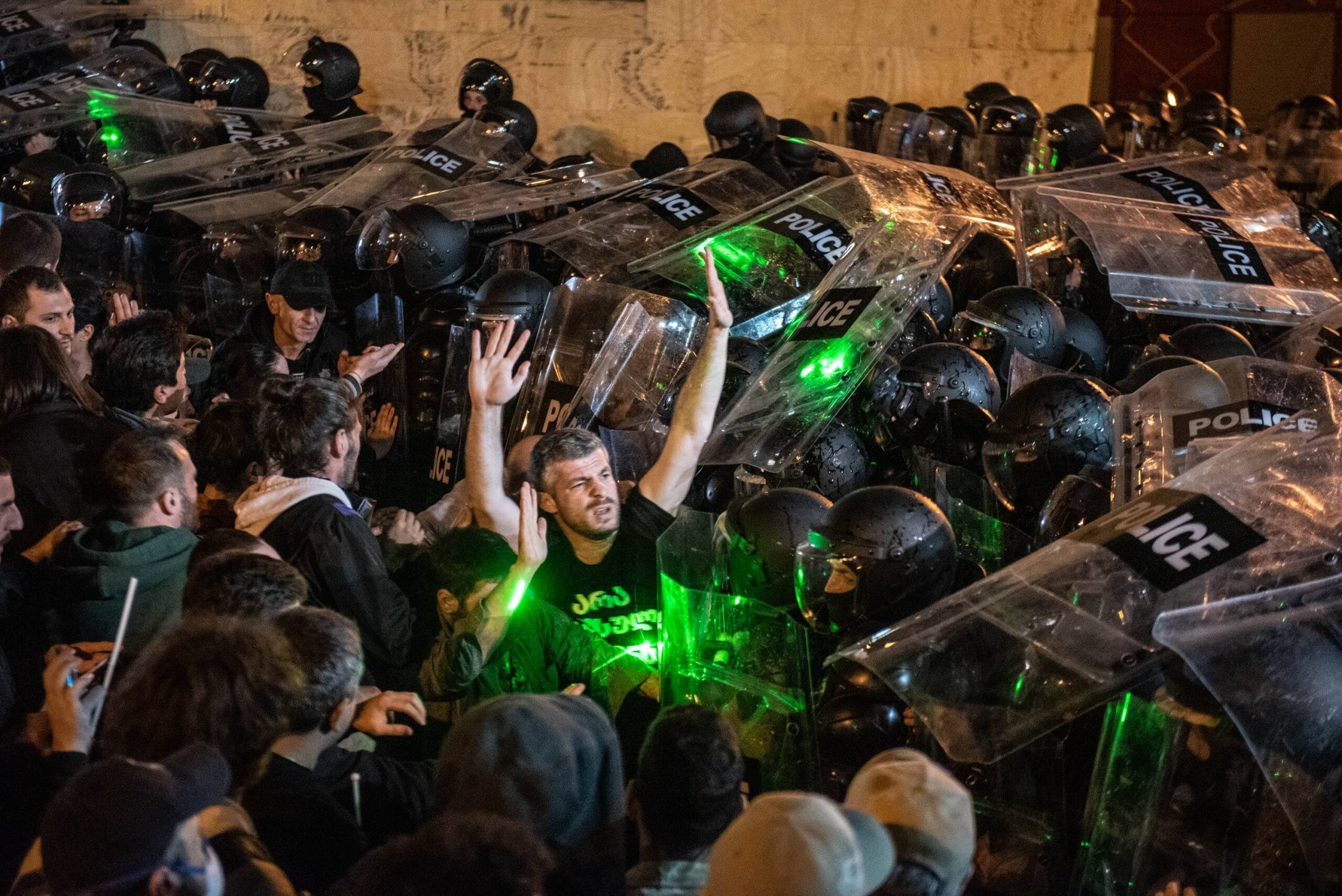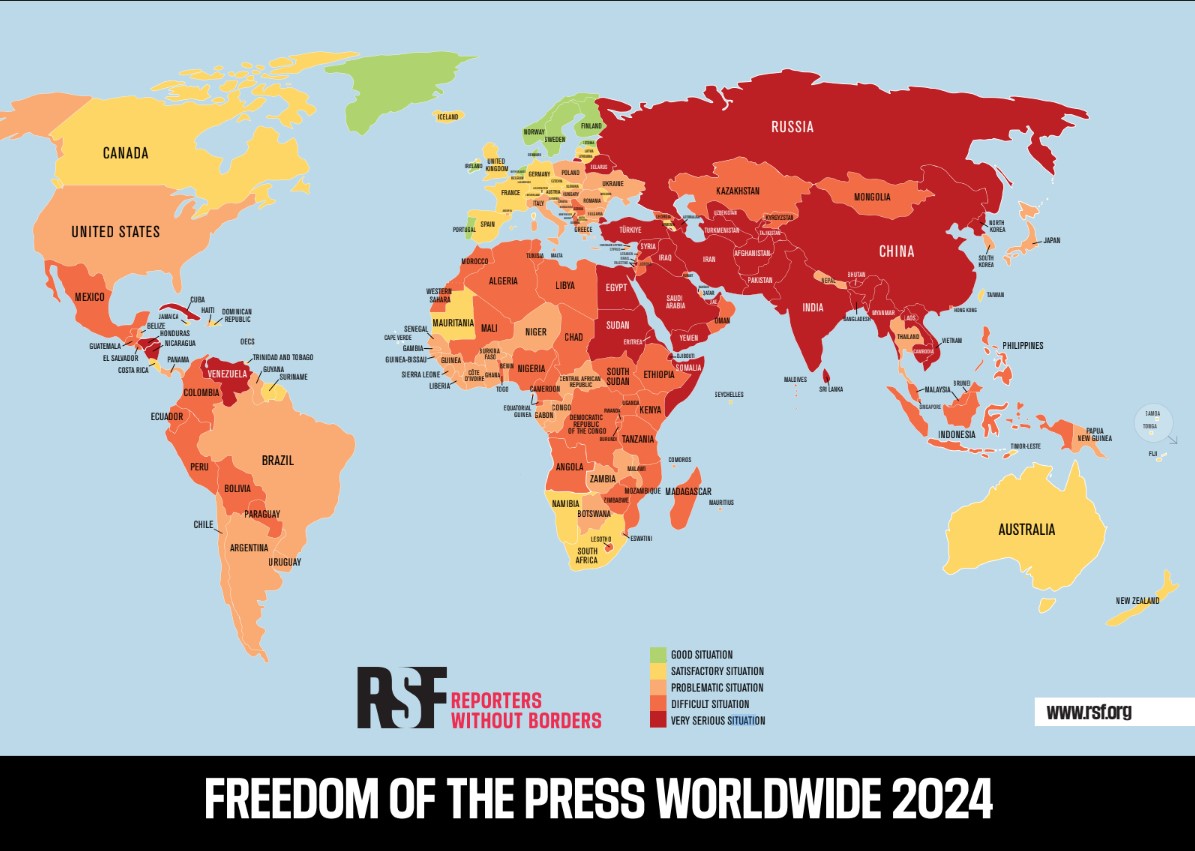
Georgia has fallen 26 places on the Reporters Without Borders’ (RSF) World Press Freedom Index, Azerbaijan fell 13 places, while Armenia gained six places on the index.
The RSF’s World Press Freedom Index ranked Georgia 103rd out of 180 — a sharp drop from its score of 77 in 2023.

Georgia’s position on the annual index has been dropping steadily since its 2021 score of 60, with its rank falling by 29 places in 2022 following the homophobic riots of July 2021.
That year, Tbilisi Pride attempted to hold a pride march in Tbilisi. Homophobic extremists began targeting journalists covering the event and the ensuing chaos, leading to the death of one journalist and the injury of 50 others.
[Read on OC Media: Journalists recall day of terror in Tbilisi]
‘The authorities didn’t show a will to prosecute the organisers of this hunt for journalists’, the head of the Eastern Europe and Central Asia Desk at RSF, Jeanne Cavelier, told OC Media.
‘No other country in the region has fallen as much as Georgia in the ranking for 10 years’, she added.
‘All the country’s indicators have deteriorated, with society becoming increasingly polarised, fuelled by the ruling Georgian Dream party, which cultivates a rapprochement with Moscow and conducts a policy that is increasingly hostile to press freedom.’
She also warned of a ‘very worrying trend showing a growing authoritarianism’ in Georgia with the ruling Georgian Dream party’s reintroduction of their controversial draft foreign agent law.
Since the bill was resubmitted to parliament for discussion in April, tens of thousands of Georgians have been protesting against the draft law on a daily basis. Georgian police have deployed force throughout these protests, deploying pepper spray, tear gas, stun grenades, water cannons, and allegedly, rubber bullets.
The police have also violently attacked protesters and journalists covering the protests.
[Read on OC Media: Editorial | Georgia’s ruling oligarch unhinged]
‘RSF calls the Georgian authorities to pull themself together and to withdraw the bill which could have dramatic consequences for journalists and the press freedom environment’.
Elsewhere in the South Caucasus, Azerbaijan also dramatically dropped 13 places on the index, with the state of media freedom in the country being categorised as ‘very serious’ by RSF.
This comes after Azerbaijan launched a crackdown on independent media in the country in November 2023, beginning with the raid of AbzasMedia and the arrest of several of their senior staff and journalists.
[Read more: Editorial | Ilham Aliyev’s attempt to eradicate the free press cannot succeed]
‘Concerned about the loss of the war’s mobilising power, [Azerbaijani President Ilham] Aliyev is trying to muzzle the few independent media still operating in Azerbaijan, whose reporting is liable to question his legitimacy’, Cavelier said of Azerbaijan’s media situation.
‘He already destroyed any semblance of pluralism but continues to target journalists, like those working for Toplum TV, to secure his dynasty’.
‘Aliyev should focus on immediately ceasing his renewed crackdown on press freedom and implementing concrete reforms to pull his country up from its abysmal ranking.’
Armenia ranked highest amongst the South Caucasus three at 43, gaining six places over its rank last year.
‘In Armenia (43th), the press freedom situation is classified as “satisfactory”. So it can be called the “new hope” of the Caucasus region’, said Cavelier while noting that Armenia had yet to address a number of challenges faced by journalists in the country.
‘There is room for improvement though. Despite a pluralistic environment, the media landscape remains polarised.’
She also said that Armenia was facing an ‘unprecedented level of disinformation and hate speech’ following the surrender of Nagorno-Karabakh in September 2022 and the ‘ongoing threat of war with Azerbaijan’.
‘To go deeper into the analysis, the safety of journalists (highest score) is guaranteed in the country, whereas the economic environment (lowest score) is difficult. It is due to a lack of ownership transparency and editorial independence.’
Cavelier also praised Armenia’s ratification of the International Criminal Court’s Rome Statute, which she said could help lower ‘levels of impunity for crimes committed against journalists’.









